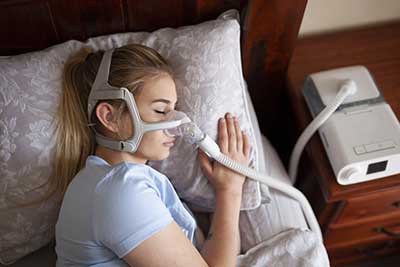Philips BiPAP Recall
Cancer Risk Prompts Philips CPAP Recall
A recent revelation that a component within the devices causes cancer has sparked the recall of millions of BiPAP, CPAP and ventilator machines made by Philips. Royal Philips, based in the Netherlands, announced the CPAP recall in June after receiving a series of reports from patients having developed cancer or another serious side effect. These reports accumulated over time--perhaps months or even years--during which 3-4 million patients continued to be exposed to a life-threatening toxin, prior to the announcement of the Philips CPAP recall.
Persons and family members of persons harmed by this dangerous medical device may be eligible for compensation via a Philips ventilator recall lawsuit. This page provides comprehensive information on the Philips BiPAP recall, including which devices are included in the Philips CPAP recall and how to file a Philips BiPAP recall lawsuit.

Types of CPAP and BiPAP Devices in the Philips Recall
There are three different types of breathing machines included in the Philips BiPAP recall. First and most prominent are the devices used in the treatment of sleep apnea: CPAP and BiPAP machines. Sleep apnea machines included in the Philips CPAP recall are in wide use, both in institutional settings such as hospitals and nursing homes, and in residential or at-home settings.
The second type of machine, which makes up a smaller proportion of the Philips recall are ventilators used for life support. These are generally in use in hospital settings such as surgical and intensive care units.
The specific problem referenced in the Philips ventilator recall notice is a foam component that is common across more than twenty different breathing machines. Over time and through exposure to heat and humidity, this part begins to degrade or break down. When it does so, toxic particles and gases are released into the machine's airflow, which the patient inhales.
Philips Ventilator Recall for Cancer
The problematic foam device which prompted the Philips CPAP, BiPAP and ventilator recall is used to quiet the machine. The sound abatement foam is made of a substance known as PE-PUR, shorthand for polyester-based polyurethane. According to the Philips BiPAP recall notice, the company had “received reports of possible patient impact due to foam degradation†that led to the global CPAP recall for 3-4 million Philips breathing devices on June 14, 2021. Put simply, anyone breathing the air released by a breathing machine included in the Philips CPAP recall may have been exposed to toxic and cancer-causing chemicals.
According to the Philips ventilator recall, exposure to chemical emission from the foam can produce the following side effects:
- Headache and dizziness
- Irritation of the eyes, skin and respiratory tract
- Hypersensitivity
- Nausea and vomiting
- Other "toxic and carcinogenic effects" including a risk of developing cancer
No one knows how long the manufacturer, Royal Philips, has been aware of the risk posed by its CPAP, BiPAP and ventilator machines. The Philips ventilator recall was foreshadowed by a shareholder warning in April of 2021, when the company referenced a “quality issue†with some of its breathing machines.
List of the Philips BiPAP Recall Machines
The following devices are subject to the Philips CPAP recall for cancer:
- All Philips CPAP devices manufactured before April 26, 2021, under all serial numbers
- All Philips BiLevel PAP devices manufactured before April 26, 2021, under all serial numbers
- E30 model continuous ventilator, minimum ventilatory support for facility use
- DreamStation non-life supporting continuous ventilator models ASV, ST, and AVAPS
- SystemOne ASV4 model continuous ventilators, non-life supporting
- C Series continuous ventilator, non-life supporting models ASV, S/T, and AVAPS
- OmniLab Advanced Plus in-lab titration device
- SystemOne Q series models of non-continuous ventilators
- DreamStation CPAP, Auto CPAP, and BiPAP ventilator models
- DreamStation Go CPAP and APAP models of non-continuous ventilators
- Dorma 400 and 500 CPAP models of non-continuous ventilators
- REMStar SE Auto CPAP models of non-continuous ventilators
- The Trilogy 100, Trilogy 200, Garbin Plus, Aeris, and LifeVent continuous ventilators
- The A-Series BiPAP V30 Auto and Hybrid A30 continuous ventilators for minimum ventilatory support for facility use
- Outside the United States, the A-Series BiPAP A30 and A40 non-life supporting continuous ventilators
Who can file a ventilator recall lawsuit?
Patients who have used one of more than twenty different types of breathing machines included in the Philips CPAP, BiPAP and ventilator recall and then developed cancer or another serious medical problem may be eligible to file a claim against the Dutch manufacturer. Click here to learn more.

Philips CPAP and BiPAP Sleep Apnea Recall
The recall included two different types of breathing machines that are used to treat sleep apnea: CPAP and BiPAP devices. Sleep apnea machines made up 80% of the 3-4 million devices included in the Philips BiPAP recall. Sleep apnea is a common medical problem suffered by some 20 million Americans. Risks of sleep apnea include short term dangers such as traffic accidents from routine sleep deprivation, as well as long term risks like stroke, heart problems and premature death. CPAP and BiPAP machines are used nightly to support patients in breathing regularly while they sleep.
The Philips CPAP recall came as a shock to the millions of patients who have relied on their sleep apnea machine on a nightly basis for years or even decades. These patients had no prior warning of the BiPAP cancer risk from their Philips machine. Anyone still using a device included in the Philips CPAP cancer recall should stop the use of the dangerous device immediately in order to prevent further inhalation of toxic and carcinogenic substances, according to the FDA.
Anyone who is using a recalled Philips CPAP or BiPAP machine for sleep apnea should discontinue use immediately due to the risk of cancer. Persons reliant on recalled Philips ventilators should be switched to an alternate device when possible.
Philips Mechanical Ventilator Recall
Of the 3-4 million devices included in the Philips recall, approximately 20% are life-supporting mechanical ventilators. Life support ventilators are essential for major surgeries and the treatment of severe health conditions. Patients experiencing a truly life-threatening health condition should rest assured the ventilator in use will not cause further harm, as those listed in the Philips ventilator recall do.
According to the FDA, any person who is currently using a life-supporting mechanical ventilator listed in the Philips ventilator recall should be switched to an alternate treatment plan if possible. These machines should be immediately phased out of use unless or until a fix is devised.
Let Our Ventilator Recall Attorneys Help You
Our lawyers specialize in holding large corporations accountable when they've placed profits ahead of safety. Through settlements and winning verdicts, our attorneys have obtained millions for our clients. Let us help you today.
Philips CPAP Recall Lawsuits
Filing a lawsuit will allow you to hold the pharmaceutical company accountable for damage it has caused you or a loved one, while also providing real compensation for your medical expenses, suffering and loss. Contact us today for a free consultation.








